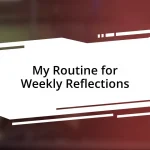Key takeaways:
- Daily journaling provides emotional clarity, promotes self-discovery, and facilitates personal growth through regular reflections.
- Establishing a consistent journaling routine, starting small, and embracing authenticity can enhance the journaling experience.
- Incorporating creativity, such as sketches or storytelling, makes journaling more engaging and helps express complex emotions.
- Overcoming challenges like writer’s block and time constraints can lead to insightful breakthroughs and a more fulfilling practice.
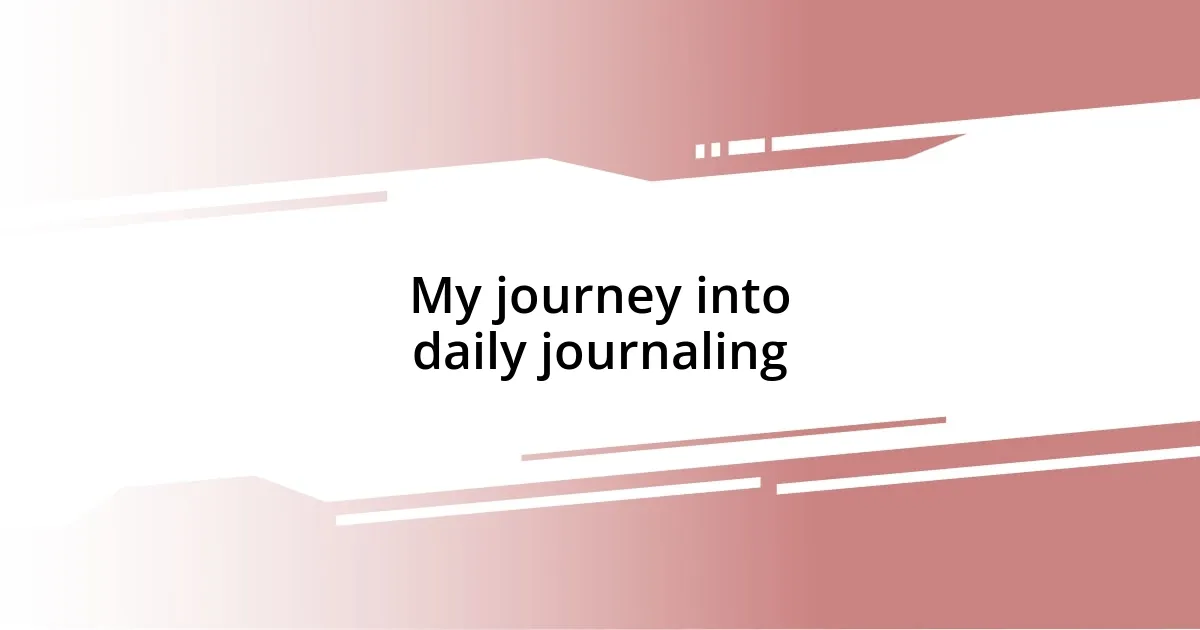
My journey into daily journaling
My journey into daily journaling began on a particularly chaotic day when I felt overwhelmed by my thoughts. I simply needed a way to untangle the mess in my mind, and that’s when I stumbled across a blank notebook that beckoned me to pour my feelings onto its pages. Have you ever felt a wave of relief just by putting pen to paper? It was like releasing a pressure valve; I could finally breathe.
As I settled into the rhythm of daily entries, I discovered that this practice was more than just writing—it became a conversation with myself. One day, while journaling about a sad event, I realized how much I had grown since then. I could trace my emotional journey just by rereading my past entries. Isn’t it fascinating how our words can lay bare our innermost thoughts and growth over time?
The unexpected surprise came when I recognized patterns in my emotions and habits. I remember reflecting on a particularly challenging week and seeing the recurring theme of self-doubt. Instead of pushing those feelings aside, I confronted them head-on within the pages of my journal. Have you ever faced something so intimately that it changed your perspective? In my case, those pages became a canvas for healing and self-discovery, and I can’t imagine my life without this habit now.
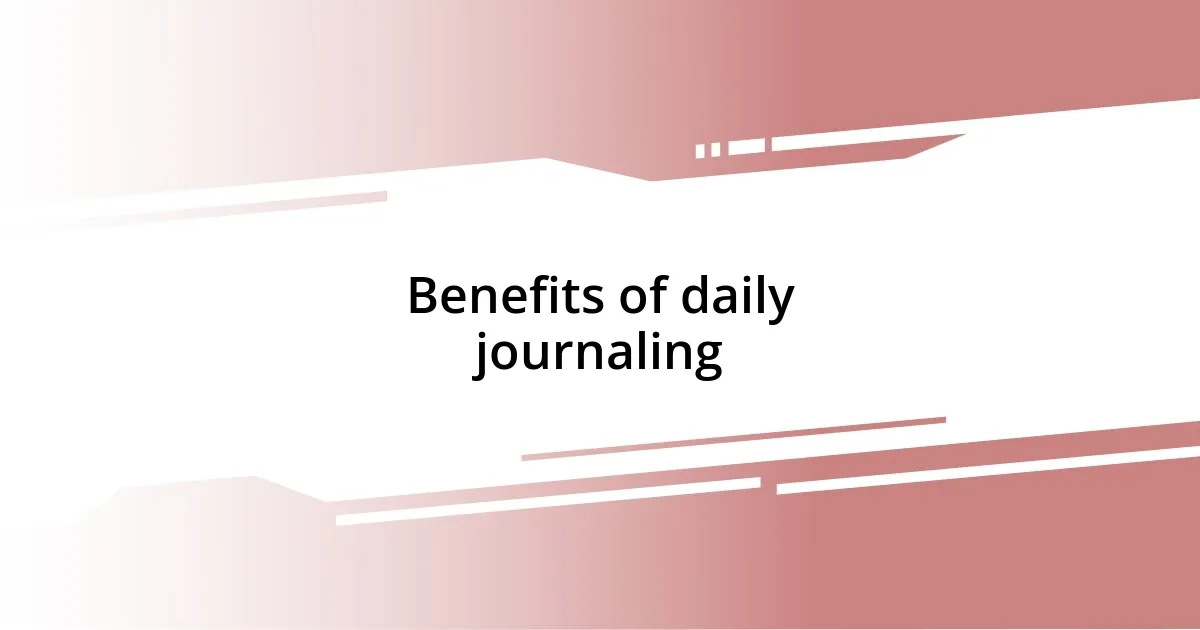
Benefits of daily journaling
Daily journaling has a profound impact on my emotional clarity. I often find that articulating my thoughts helps untangle the knots of my feelings. There’s something cathartic about witnessing my fears and hopes manifest on paper. It’s as if I’m having an intimate dialogue with myself, allowing me to confront issues I didn’t even realize were weighing me down. I can remember a night when I poured my heart out about a difficult decision. The resulting clarity was like flipping a light switch in a dimly lit room; I could finally see my next steps.
Here are some benefits I’ve personally experienced from daily journaling:
- Enhanced Emotional Awareness: By regularly reflecting on my thoughts, I’ve grown to understand my feelings better.
- Stress Reduction: Writing about challenging experiences has provided me with immediate relief from anxiety.
- Boosted Creativity: Journaling has become a springboard for my ideas, inspiring new projects I never imagined pursuing.
- Increased Mindfulness: The practice encourages me to be present and appreciate the moment, fostering gratitude.
- Goal Setting: Documenting my aspirations has transformed abstract goals into actionable plans.
These benefits intertwine to create a richer, more fulfilling daily experience. Each entry evokes a sense of achievement and evolution, reminding me that growth is a continuous journey.
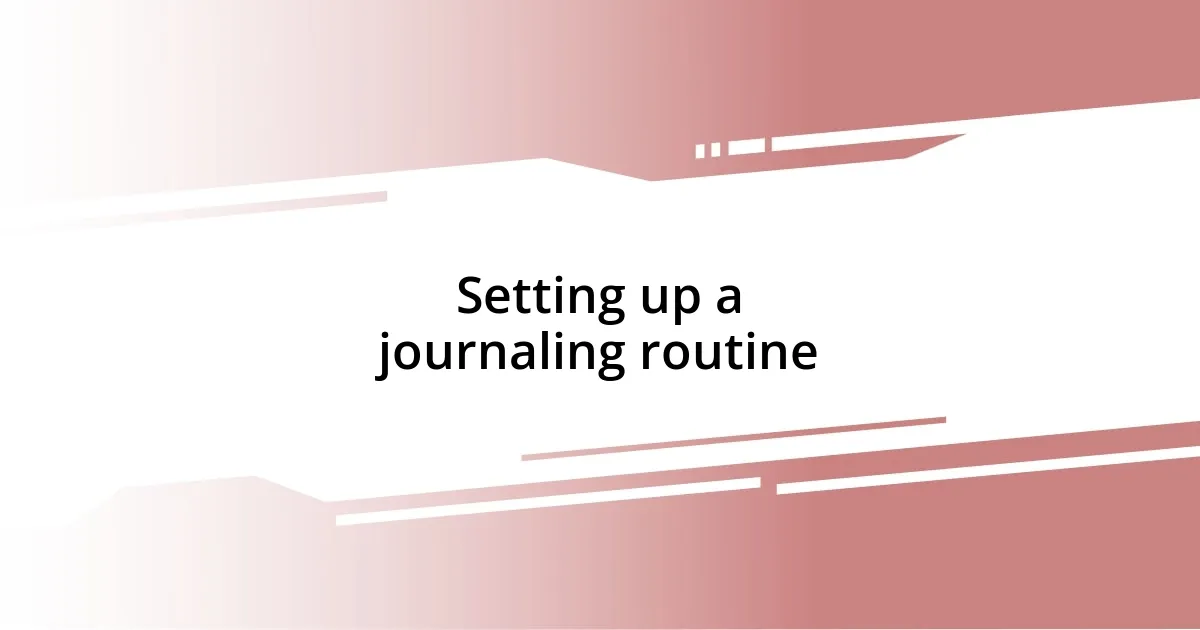
Setting up a journaling routine
Establishing a journaling routine can be a transformative experience. Personally, I found that consistency was key. I set a specific time each day—often in the early morning—where I could enjoy a quiet moment with my thoughts. Having a dedicated space, like my cozy reading nook, made the experience feel special and intentional. What about you? Have you thought about where and when feels right for you?
In my journey, I discovered that starting small was incredibly beneficial. Initially, I aimed for just a few sentences. This approach eased any pressure to write grandiose entries and made journaling feel manageable. There were days when I could only jot down my mood or a single highlight. Do you ever find that the simplest moments hold the most weight? Reflecting on a mundane day but capturing a fleeting emotion helped me appreciate the nuances of life.
Here’s a neat way to compare different journaling methods that might suit your style:
| Method | Description |
|---|---|
| Stream of Consciousness | Writing continuously without filtering your thoughts. |
| Bullet Journaling | Using concise bullet points for quick reflections. |
| Gratitude Journaling | Focusing specifically on things you are thankful for. |
| Prompt Journaling | Using specific questions or prompts to guide your writing. |
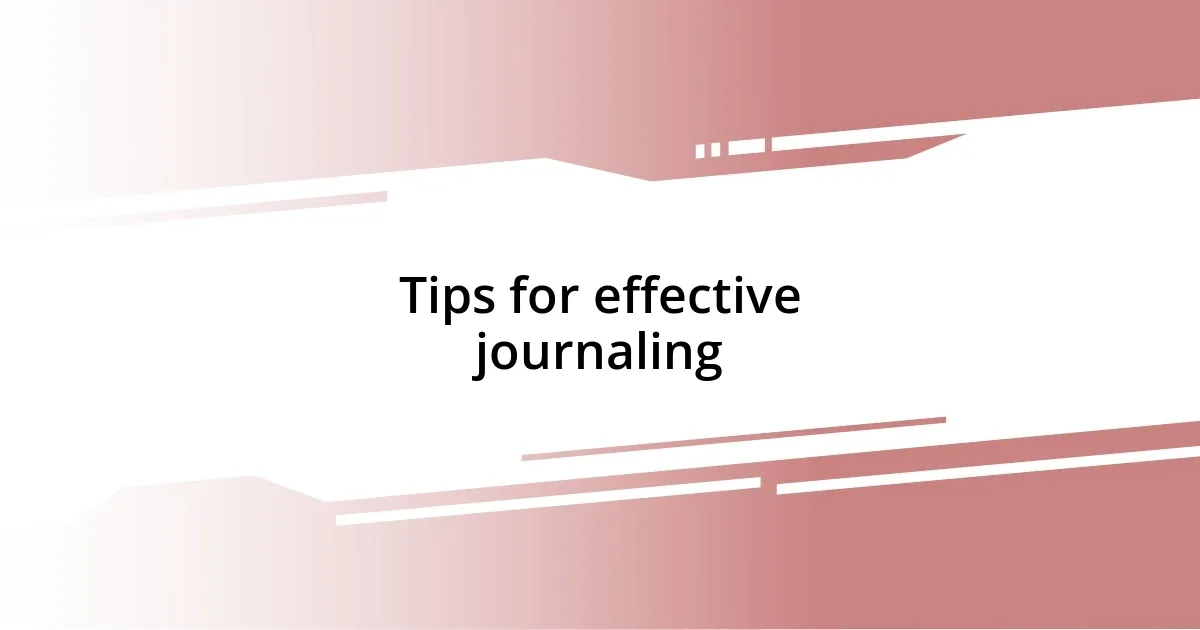
Tips for effective journaling
To make the most out of journaling, I’ve found that being authentic is crucial. When I write, I allow myself to be completely honest, even if it feels uncomfortable. It might sound surprising, but I’ve had days when I only wrote about my frustrations. Embracing those emotions not only lightened my mental load but also revealed patterns I wouldn’t have noticed otherwise. Have you ever considered how your true feelings can guide you toward personal growth?
In addition, I suggest experimenting with different prompts and themes. There was a week when I focused solely on gratitude, listing three things each day that made me smile. Those simple acts of acknowledgment shifted my perspective significantly. I remember one entry about my morning coffee—something I usually take for granted—that shifted into an appreciation for quiet moments. Isn’t it amazing how the ordinary can become extraordinary with a little focus?
Finally, don’t hesitate to revisit your entries. Personally, I love flipping back to see how I’ve evolved over time. It’s like holding a mirror to my past, allowing me to reflect on both struggles and triumphs. Each reread often prompts new thoughts and insights, reminding me how far I’ve come. Have you ever looked back at past journal entries and felt that wave of nostalgia wash over you? In those moments, I often find a renewed sense of purpose and clarity for the days ahead.
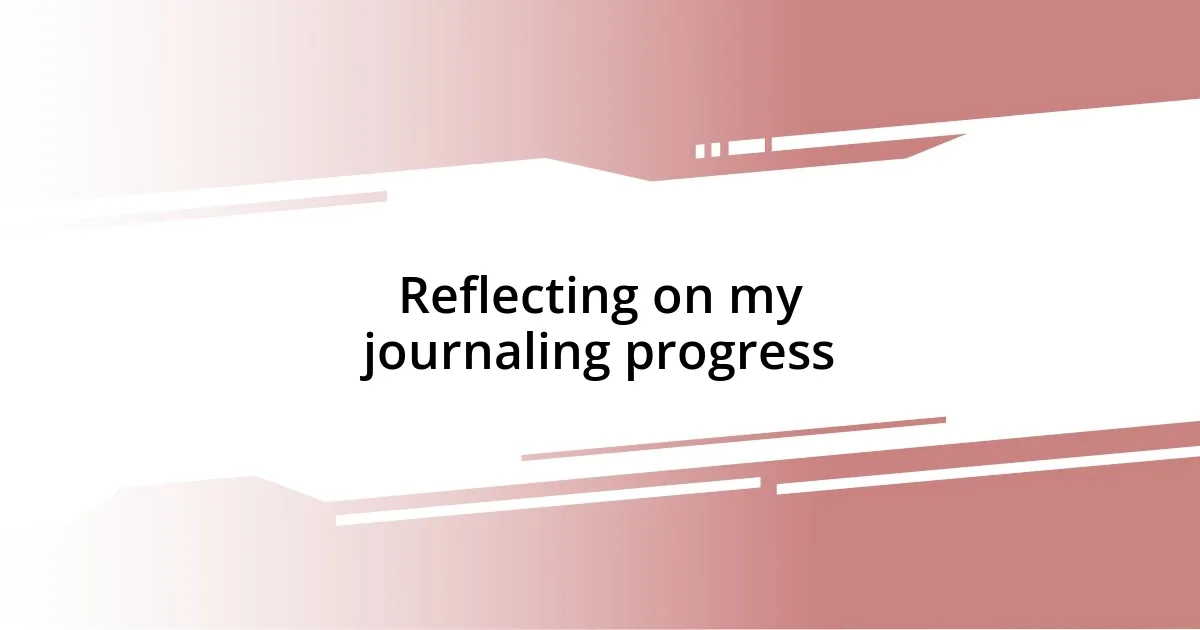
Reflecting on my journaling progress
Reflecting on my journaling progress is like flipping through a scrapbook of my thoughts. I remember one instance when I noticed a recurring theme of self-doubt in my entries. It hit me that my feelings were valid, but I also realized I had the power to change my narrative. Has anyone ever experienced that shift from feeling stuck to reclaiming your voice in writing?
As I looked back over the past few months, I could practically see the evolution of my mindset. There was a particular entry where I vented about feeling overwhelmed by work, and reading it now makes me smile at how far I’ve come. I wrote a simple line about wanting to embrace challenges rather than fear them. That small note kicked off my journey towards resilience. Can you recall a moment when writing something seemingly trivial sparked significant personal change?
One of the most rewarding aspects of journaling has been recognizing patterns in my emotional responses. I recall a period when my entries were filled with descriptions of stress, and checking in with myself during that time illuminated how my environment was impacting my mood. By seeing these connections, I could proactively create a healthier space for myself. Isn’t it enlightening how our thoughts can illuminate the complexities of our daily lives?
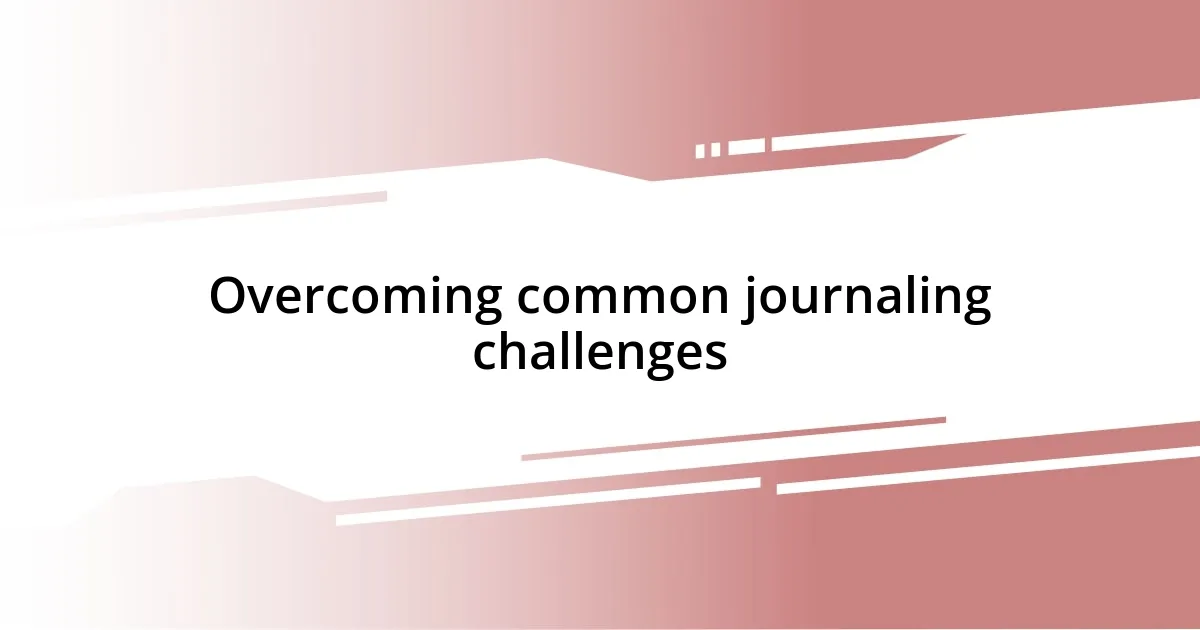
Overcoming common journaling challenges
One common challenge I faced in journaling was dealing with writer’s block. There were days when I would sit in front of my notebook, pen poised, and nothing would come to mind. I discovered that setting a timer for just five minutes and writing whatever popped into my head, even if it seemed nonsensical, often broke that barrier. Have you ever noticed how the pressure dissolves when you give yourself permission to create without judgment?
Another obstacle was feeling a sense of obligation to write perfectly articulated thoughts. Early on, I’d sit in frustration because my entries didn’t match the eloquence I desired. I learned to embrace the beauty of imperfection. One day, I scribbled a chaotic list of my worries, and it actually sparked a moment of clarity that I hadn’t anticipated. Isn’t it interesting how sometimes the messiest moments can lead to profound insights?
Time constraints also posed a challenge for me. I often thought that I needed at least 30 minutes to journal effectively, which led to feelings of guilt when I couldn’t find that time. But then, I realized even a quick few lines about my day or feelings could be impactful. There are days when just a couple of sentences are enough to capture what I’m experiencing—like the time I noted how sunlight streaming through my window lifted my spirits during a tough week. How have you found ways to adapt journaling to fit your day-to-day routine?
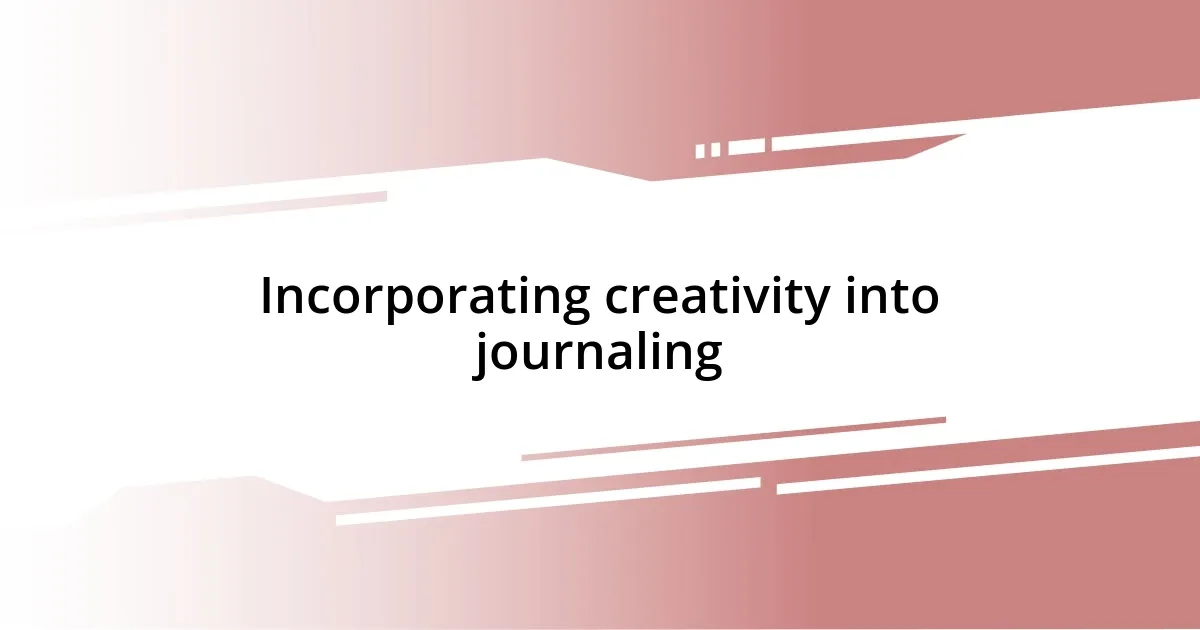
Incorporating creativity into journaling
Incorporating creativity into my journaling practice has been a game changer. On days when I felt uninspired, I turned to visual elements—sketches, doodles, or even color coding my thoughts. I remember the day I drew a simple tree to represent my family, and it opened up a floodgate of emotions. Have you ever noticed how art can sometimes express what words fail to capture?
I also experimented with different formats, like writing poetry or crafting short stories from my entries. There was a time I transformed a frustrating day at work into a humorous narrative about a superhero—me—who battled the “villains” of deadlines and meetings. It felt liberating and brought a smile not just to my face, but also helped me see challenges in a new light. Doesn’t putting a twist on your day-to-day experiences make journaling feel refreshing?
Music plays a role too; I often jot down thoughts while listening to songs that resonate with my emotions. One evening, a particular melody inspired me to write a letter to my future self. It was deeply cathartic, bridging my present feelings with hopes and aspirations for tomorrow. Have you ever let music guide your thoughts in unexpected ways?







